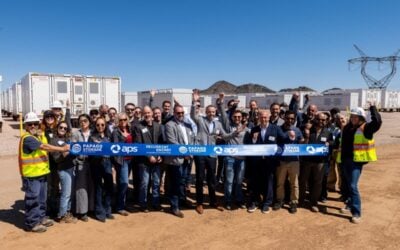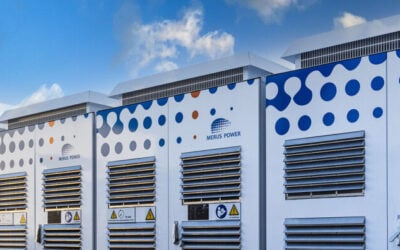A Tesla Model S, connected to Powerwall. Image: Tesla.
Prices for Tesla’s stationary storage systems for homes, businesses and off-grid communities, to be packaged and sold in partnership with SolarCity, will begin at US$3,000, thought to be as little as a third of the price of comparable products previously available on the market.
EV manufacturer Tesla finally unveiled the commercial rollout of its range of battery systems for stationary storage applications last night at an event in Silicon Valley. While a few hundred of the company’s batteries have already been deployed at commercial and residential level, mostly through its tie-up with SolarCity, Tesla CEO Elon Musk officially announced the company’s expansion into storage batteries during a launch event at the company’s design facility near Los Angeles.
Enjoy 12 months of exclusive analysis
- Regular insight and analysis of the industry’s biggest developments
- In-depth interviews with the industry’s leading figures
- Annual digital subscription to the PV Tech Power journal
- Discounts on Solar Media’s portfolio of events, in-person and virtual
With the announcement long awaited, anticipation had built and speculative articles had appeared in mainstream, niche and industry media, guessing at the nature of the innovations hinted at by Musk and the company in the lead up to the unveiling.
While much of the technology involved was already fairly well fleshed out in the pilot programmes, some commentators expected Tesla’s innovations to focus on business models or cost reduction points, the latter of which especially seems to ring true. PV Tech Storage spoke with analyst Cosmin Laslau of Lux Research two days ago, who said that pricing was likely to be a big aspect of the whole picture.
"Tesla could be in one of the strongest positions in the energy storage world to offer a large number of customers to finance energy storage and kind of spur adoption in a way that we haven’t seen before," Laslau said.
The company said the Powerwall Home Battery, available in 10kWh for backup applications or 7kWh for daily use applications, will start at US$3,500 for the 10kWh model, while the 7kWh version is tabbed at US$3,000. Price excludes inverter and installation. Deliveries are expected to begin later this summer and the batteries will be offered with a 10-year warranty and optional 10-year warranty extension.
In addition, the Tesla Energy range includes DemandLogic, the company’s commercial storage product which has already been available in some parts of the US since late 2013. Also announced was GridLogic, a micro-grid battery system.
SolarCity co-founder and CTO Peter Rive wrote on his company’s blog last night that the systems enable SolaCity to offer “fully-integrated and affordable solar battery backup systems for homes, businesses and utilities”.
With the residential batteries mostly offered for backup at present and DemandLogic offered to enable demand charge reduction for businesses, it will be interesting to see what further developments will come in terms of the batteries’ use and what kind of business models for both revenue and cost savings might be enabled in future.
Rive’s blog discussed in particular the possibility of aggregating the capabilities of a number of connected storage systems, controlled remotely by utility companies. Rive said aggregated batteries could provide capacity, reactive power or voltage management and directly appealed to "anyone reading this who is responsible for managing grid operations" to contact SolarCity. Just a week ago, SolarCity announced a US$1 billion fund invested in by Credit Suisse to scale up its targeting of the commercial PV market segment in the US, with energy storage intended as a significant part of that push.
“Proceedings currently underway, such as the New York REV and California’s More than Smart, seek the creation of effective market structures for distributed clean energy services that will reward utilities for adopting cheaper, cleaner, customer-sited resources. The products that we’re announcing today are the building blocks of these new market structures," Rive wrote.
“Our customer contract explicitly contemplates the potential of these markets and creates a revenue-sharing opportunity for the customer.”
PV Tech has spoken to a number of experts and industry sources on the aggregation concept, sometimes referred to as a form of ‘virtual power plant’. According to one industry expert, Chris Edgette, a director at the California Energy Storage Alliance (CESA) and a distributed energy consultant, it is hoped that market structures to enable these and other new use cases for aggregated energy storage could be put into place in California by the end of this year.
Tesla has also agreed to partnerships with other renewable energy companies to market the Powerwall, including Treehouse, Green Power Energy and SolarEdge. Utilities and energy technology companies Southern California Edison, AES, OnCor and Advanced Microgrid Solutions are also said to have signed up to harness Tesla’s new products.
Additional reporting by Conor Ryan.
The Tesla home storage box will come in a range of colours and will be sized in 7kWh and 10kWh versions. Image: Tesla.






